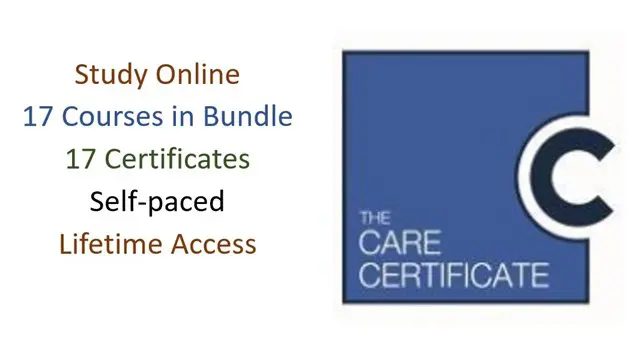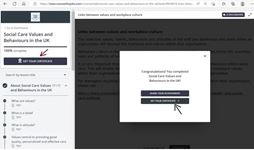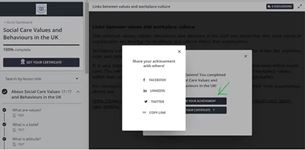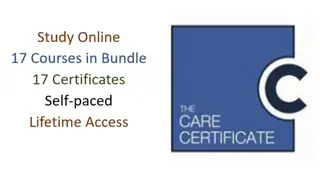
Care Certificate (Standards 1 to 15) + Health & Social Care, Mental Health & Wellbeing
17 Separate Courses with Free Certificates | Easy Access | Fee includes Tests, Free Retakes
Courses For Jobs Ltd
Summary
- Certificate of completion - Free
- Exam(s) / assessment(s) is included in price
- Tutor is available to students
Add to basket or enquire
Overview
Care Certificate 15 Standards plus 2 free Bonus Courses
This Care Certificate covers the 15 different Care Certificate standards delivering the knowledge, skills and behaviours for care staff. Two further bonus courses provided to further support the care worker.
17 Courses with Free Digital Certificates
Fee includes Exams, Retakes, Certificates
Easy Access
Care Certificate is available to everyone, anywhere, without restrictions. No eligibility criteria.
Those working in a non-care job within a care setting can study this course e.g. a cook or maintenance person.
Care Certificate bundle includes:
- Learning and e-Assessments for each Care Certificate Standard
- Free PDF certificate for each standard (15) and a separate certificate for the full Care Certificate (16 certificates).
- Bonus course - Support individuals who are distressed (with certificate)
- 17 Free separate Certificates
- Coursework follow care frameworks approved by Skills For Care and Care Quality Commission (CQC)
- All certificates are held securely online
- Skills for Care eWorkbooks
- Skills For Care Standards ebooklet
- Employer progress logs, mapping and sign off documents
Care Certificate Overview
The Care Certificate is a set of 15 Care Certificate Standards for induction of all care staff in all health and social care settings.
The Care Certificate was jointly developed by Skills for Care and Development - SFCD (Sector Skills Council for Adult Social Care), Skills for Health (Sector Skills Council for Health) and Health Education England.
The Care Certificate course meets the essential staff induction standards as legally required for care organisations regulated by CQC (Care Quality Commission).
The Care Certificate 15 Standards are 15 separate courses each with a certificate :
- Standard 1. Understand your role
- Standard 2. Your personal development
- Standard 3. Duty of care
- Standard 4. Equality and diversity
- Standard 5. Work in a person-centred way
- Standard 6. Communication
- Standard 7. Privacy and dignity
- Standard 8. Fluids and nutrition
- Standard 9. Awareness of mental health, dementia and learning disability
- Standard 10. Safeguarding vulnerable adults
- Standard 11. Safeguarding children
- Standard 12. Basic life support
- Standard 13. Health and safety
- Standard 14. Handling information
- Standard 15. Infection prevention and control
16 - UK Health and Social Care National Standards course covers:
- Working in health and social care sector in England
- Types and Levels of Job Roles available
- Types and Sizes of Recognised Qualifications
- What is legally classed as a Diploma in England, and what is not
- National Occupational Standards for different job roles
- Code of Conduct in Health and Social Care
- Qualifications that support career progression within Adult Social Care in England
17 - Mental Health and Resilience Training course covers:
- Understand how to safeguard mental health
- Understand Resilience and mental toughness
- Recognising and coping with pressure and stress
- Pressure in-the-moment, Coping Strategies
- Long term pressure, Coping Strategies
- Manage your work-life balance - Tips to help you
- Tools for building your own resilience, mental health and well-being
- Responsibilities for mental health at work and resilience
- Tools for supporting Your Mental Health in challenging situations
- Tools for developing mental resilience in your team members
Why study with Courses For Jobs Ltd
Our modern secure password-protected online LMS (Learning Management System) make it easy to gain the learning needed, regardless of their internet ability or devices. No downloads or PDFs required.
To study your coursework, all the learner has to do is "point and click", making it easy to get through 100% of learning resources, tests, certificates, etc.
The only requirement is learner's email address so that login details can be emailed to the learner.
Our LMS provides you with easy online access to all your learning materials, your tests/exams, your completion certificates, along with dedicated support by assessors, tutors, and peers via the private online community for the particular course.
You will receive quick responses via the LMS, to your queries and requests for support.
After taking a test linked to the course, the results are immediately available. Retakes of tests can be done anytime.
On completing a course, the completion certificate is immediately available to you as a PDF document in your secure online learner account, for you to download whenever you want.
Within your learner account is a link to each certificate, that you can share with employers and recruiters to view your completion certificate(s) online. Therefore you don't need to email each certificate as attachment to recruiters or employers, as they can view it via the link you share with them.
Certificates
Certificate of completion
Digital certificate - Included
When you complete 100% of the course, your PDF certificate of completion becomes available for download in your Learner Account on our LMS - Free.
You receive one completion certificate per Care Certificate Standard (Total 15 Certificates) - FREE
And also a separate final Certificate Free, for completing the full Care Certificate and also the Bonus Course
Course media
Description
About the Care Certificate
The Care Certificate is an induction programme on an agreed set of standards for staff within health and social care.
The Care Certificate is made up of the 15 Care Certificate Standards covers the knowledge, skills and behaviours expected of all care workers in the health and social care sectors, and it forms part of a robust work induction programme.
The Care Certificate is line with the latest UK legislation and meets the requirements set out by Skills for Care, the Care Quality Commission (CQC), and other professional and regulatory bodies in the UK.
Detailed Course Content
Care certificate Standard 1 - Understand Your Role
- their responsibilities within their job role,
- Understand their own role
- Work in ways that have been agreed with their employer
- Understand working relationships in health and social care
- Work in partnership with others
Care certificate Standard 2 – Your Personal Development
- importance of personal development at work,
- how to plan their personal development plan and why this is important.
- how to develop their own knowledge, understanding and skills including their core skills,
- use of supervision, appraisals and SMART objectives.
Care certificate Standard 3 – Duty of Care
- the importance of duty of care in your role,
- how duty of care contributes to safe practice,
- support available for addressing dilemmas that may arise about duty of care,
- the ways to deal with comments, complaints, incidents, errors and near misses in your work,
- using policies and incident forms.
Care certificate Standard 4 – Equality and Diversity
- the meaning of equality, diversity, discrimination,
- the different types of discrimination, at the barriers to equality and diversity in care, The Equality Act 2010 and the nine protected characteristics.
- how to work in an inclusive way
Care certificate Standard 5 – Work in a person-centred way
- Understand person-centred values
- the importance of working in a person centred way, including the 6Cs of care,
- factors that may cause discomfort or distress
- how to support individuals to minimise pain or discomfort
- how to support the individual to maintain their identity and self-esteem
- how to support individuals using the person-centred approach, the Care Act 2014 and the Mental Capacity Act 2005.
Care certificate Standard 6 – Communication
- effective communication and why it is important in your role,
- different types of communication, including verbal and non-verbal communication,
- how to meet the communication and language needs, wishes and preferences of individuals,
- how to support the use of communication aids and technologies
- why confidentiality in care is vital, and when confidentiality can be broken.
Care certificate Standard 7 – Privacy and dignity
- the principles that underpin privacy and dignity in care,
- how to maintain and respect privacy and dignity, and raise concerns
- helping individuals to make informed choices
- how to support active participation
Care certificate Standard 8 – Fluids and nutrition
- the importance of nutrition and hydration,
- importance of food safety and the relevant food safety legislation
- how to assess nutrition and hydration needs in a person-centred way
- circumstances that may affect an individual’s food and drink choice, such as beliefs, preferences, health conditions, medicines and support needed for individuals to eat and drink.
Care certificate Standard 9 – Awareness of Mental Health, Dementia and Learning Disability
- awareness of mental health, dementia and learning disabilities,
- relevant key legislation,
- the ways to promote communication with individuals who have learning disabilities,
- common mental health problems,
- meaning of mental capacity in relation to how care is provided
Care certificate Standard 10 – Safeguarding Adults
- the importance of safeguarding vulnerable adults
- what constitutes harm
- why an individual may be vulnerable to harm or abuse
- types of abuse that can occur, including Domestic Violence and Abuse Awareness
- signs and symptoms that indicate when a person is being abused,
- relevant legislation that applies to safeguarding vulnerable adults,
- how to reduce the likelihood of abuse
- how to record and report any safeguarding concerns.
Care certificate Standard 11 – Safeguarding Children
- the importance of safeguarding children,
- types of abuse children can experience
- signs and symptoms that indicate a child is being abused.
- Adverse Childhood Experiences (ACEs)
- Risk factors that increase the likelihood of abuse of a child in their own home
- Your Role in Safeguarding Children
- how to record and report safeguarding concerns.
Care certificate Standard 12 – Basic life support
- basic life support training,
- importance of CPR and the role of hand-only CPR,
- signs and causes of cardiac arrest,
- causes of an obstructed airway
- treatment of choking in adults, infants and children
- UK Resuscitation Council Resuscitation Guidelines
Care certificate Standard 13 – Health and Safety
- health and safety in care settings,
- main health and safety legislation that apply to health and social care workers, employer and employee responsibilities,
- health and safety in relation to administering medication, needles and sharps, moving and handling and using correct PPE
- promoting fire safety
- working securely
- managing stress
Care certificate Standard 14 – Handling information
- agreed ways of working and legislation regarding the recording, storing and sharing of information,
- importance of secure systems for recording, storing and sharing information,
- the eight Caldiott Principles,
- data protection principles and relevant legislation,
- how you can report concerns regarding the recording, storing or sharing of information internally, whistleblowing and reporting concerns externally
- data breaches and how to avoid them
- principles of good record keeping
- responsibilities of health and social care organisations under the Freedom of Information Act 2000
Care certificate Standard 15 – Infection control
- different types of infections,
- the chain of infection, the entry and exit routes of transmission and how to break the chain of infection,
- short-term and long-term consequences of infections
- employer and employee responsibilities regarding infection control
- effective hand hygiene
- principles of safe handling of infected or soiled linen and clinical waste
Who is the Care Certificate for?
Everyone, including:
- Healthcare Assistants
- Social Care Support Workers
- Nurses
- Allied Healthcare Workers
- Doctors
- Voluntary Staff working in all areas of care
- Anyone changing jobs within the care sector
Requirements for the Care Certificate:
- The Care Certificate is openly available to everyone
- No prior learning knowledge or experience is required
- Your time
- Your motivation
- Access to am internet-enabled device, e.g. smartphone
How the Care Certificate is assessed
The online resources include e-Assessments with Multiple Choice Questions (MCQ) and activities.
Retake the MCQ at no additional cost.
Completion of e-assessments provides evidence towards meeting the knowledge and competence requirements.
Progression after completion of the Care Certificate
Successful learners will work in:
- Hospitals, GP Surgeries and other acute health settings
- Domiciliary services (home care/home help)
- Residential care (care homes)
- Community care such as Day Care
- Supported living projects
- Community-based care
- Private care for a person or family
Who is this course for?
This course is openly available to everyone, anywhere in the world.
There are no geographical restrictions.
Who is the Care Certificate for?
Everyone including:
- those who work with social care, health care, and community care, at any level and in any role
- Healthcare Assistants
- Social Care Support Workers
- Nurses
- Allied Healthcare Workers
- Doctors
- Voluntary Staff working in all areas of care
- Anyone changing jobs within the care sector
Successful learners will work in:
- Hospitals, GP Surgeries and other acute health settings
- Domiciliary services (home care/home help)
- Live-in Personal Assistants
- Residential care (care homes)
- Community care such as Day Care
- Supported living projects
- Community-based care
- Private care for a person or family
Requirements
Requirements for the Care Certificate:
- The Care Certificate is openly available to everyone, anywhere
- No prior learning knowledge or experience is required
- Your time
- Your motivation
- Internet Access to a computer device, e.g. desktop, laptop, tablet or smartphone device
- Honesty
Career path
Job Roles
- Care Assistant
- Health Care Assistant (HCA)
- Senior Support Worker
Successful learners will work in:
- Hospitals, GP Surgeries and other acute health settings
- Domiciliary services (home care/home help)
- Residential care (care homes)
- Community care such as Day Care
- Supported living projects
- Community-based care
- Private care for a person or family
Questions and answers
I’ll like to enquire if the certificate gotten from this course is sufficient for recruiters as I intend applying for a care job Is it nvq certified?
Answer:You have to ask recruiters what they require for a particular care job. There is nothing called nvq certified. NVQ means National Vocational Qualification and refers to a competence-based qualification that is recognised by Ofqual, the Office of Qualifications and Examinations Regulation, the non-ministerial government department that regulates qualifications, exams and tests in England. The Care Certificate is not a qualification, it is a set of minimum induction standards for care staff.
This was helpful.Before i begin a course here, do I need to check what the employer requires of me? As to know the exact course to study
Answer:It is up to you how you make a decision on which course to study. The course information we provided is detailed enough to enable prospective students to decide whether they want to study it or not.
This was helpful.Is a 15hr course taken at a go or it is stretched out for days and if yes, how?
Answer:This learning is self-paced by the learner, and the learner decides how they want to study their learning materials.
This was helpful.
Reviews
Legal information
This course is advertised on reed.co.uk by the Course Provider, whose terms and conditions apply. Purchases are made directly from the Course Provider, and as such, content and materials are supplied by the Course Provider directly. Reed is acting as agent and not reseller in relation to this course. Reed's only responsibility is to facilitate your payment for the course. It is your responsibility to review and agree to the Course Provider's terms and conditions and satisfy yourself as to the suitability of the course you intend to purchase. Reed will not have any responsibility for the content of the course and/or associated materials.





